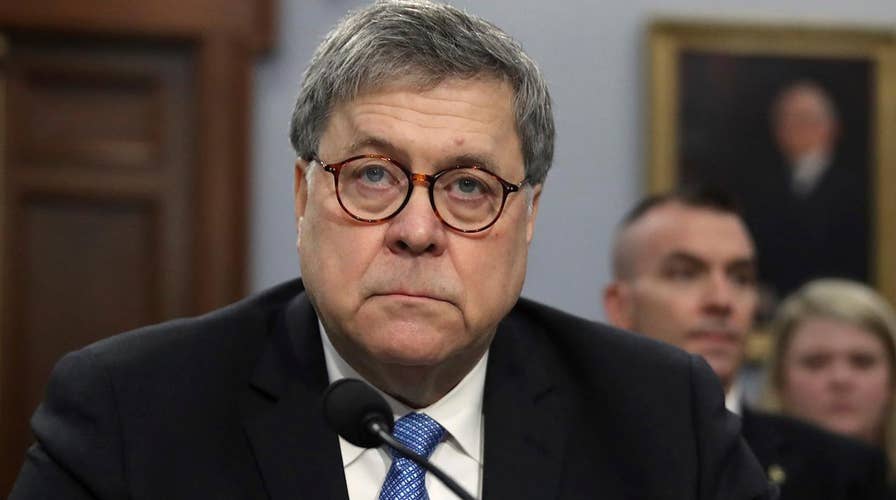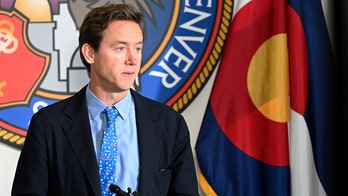Barr: Full Mueller report with redactions will be released within a week
Appearing before a House subcommittee hearing, Attorney General William Barr explains to lawmakers how redactions will be identified and says his timetable for a mid-April release still stands.
Attorney General William Barr revealed Tuesday that he is reviewing the “conduct” of the FBI’s original Russia investigation during the summer of 2016, following calls from Republicans to investigate the origins of the probe.
Barr testified before a congressional panel in what was his first Capitol Hill appearance since revealing the central findings of Special Counsel Robert Mueller’s investigation. Barr was grilled by Democrats on the handling of that summary, which stated the special counsel found no evidence of collusion between members of the Trump campaign and Russia during the 2016 election -- but he was also questioned about the initial Foreign Intelligence Surveillance Act (FISA) warrants approved to surveil members of the Trump campaign.
Barr explained that Justice Department Inspector General Michael Horowitz has a pending investigation into the FISA warrants and said the probe will be complete by May or June. He then confirmed he's personally reviewing the investigation itself.
“More generally, I am reviewing the conduct of the investigation and trying to get my arms around the aspects of the counterintelligence investigation that was conducted in the summer of 2016,” Barr testified.
The comments come after House Intelligence Committee Ranking Member Devin Nunes, R-Calif., said over the weekend he was preparing to send eight criminal referrals to the Justice Department this week regarding alleged misconduct by DOJ and FBI officials during the Trump-Russia investigation. It is unclear whom Nunes will refer for investigation, and what the process at the Justice Department might be.
When asked Tuesday about Nunes’ referrals, Barr said he hasn’t seen them yet, but, “Obviously, if there is a predicate for investigation, it will be conducted.”
Barr’s review could dovetail with the work U.S. Attorney John Huber has been doing. In 2017, former Attorney General Jeff Sessions appointed Huber to review not only alleged surveillance abuses by the Justice Department and the FBI but also the handling of the probe into the Clinton Foundation and other matters.
ON OFFENSE IN RUSSIA PROBE, TRUMP URGED TO CONSIDER NEW SPECIAL COUNSEL, CRIMINAL REFERRALS
But Republicans have expressed concern about Huber’s investigation, saying he’s made little progress and has not interviewed individuals they believed he should. Republicans, including President Trump, have only stepped up calls to investigate the origins of the Russia investigation with the completion of the Mueller investigation.
The day following Barr’s release of his summary of the Mueller report, Senate Judiciary Committee Chairman Lindsey Graham, R-S.C., said his panel would investigate alleged FISA abuses at the start of the Russia investigation and called on Barr to appoint a new special counsel to investigate “the other side of the story.” Graham has been calling for a second special counsel since 2017 to investigate “whether or not a counterintelligence investigation was opened as a back door to spy on the Trump campaign.”
NUNES TO SEND EIGHT CRIMINAL REFERRALS TO DOJ CONCERNING LEAKS, CONSPIRACY AMID RUSSIA PROBE
Days later, Fox News learned that the president was enthusiastic about the idea of appointing a second special counsel. The president has repeatedly tweeted support for a review of some kind.
The investigation was formally opened by Peter Strzok, a former senior counterintelligence agent, during the summer of 2016. Former FBI counsel Lisa Page, with whom Strzok was romantically involved, revealed during a closed-door congressional interview that the FBI “knew so little” about whether allegations against the Trump campaign were “true or not true,” at the time that they opened the probe, noting that they had just “a paucity of evidence because we are just starting down the path” of vetting the allegations. Page later said that it was “entirely common” that the FBI would begin a counterintelligence investigation with just a “small amount of evidence.”
The FBI, at the time, was led by former Director James Comey and former Deputy Director Andrew McCabe -- both fired by the Trump administration.
Meanwhile, Barr vowed Tuesday to release the Mueller report to the public "within a week."
“Right now the special counsel is working with us. This process is going along very well and my original timetable of being able to release this by mid-April stands," Barr testified. "From my standpoint, within a week, I will be in a position to release the report to the public and then I will engage with both chairmen of Judiciary Committees on any requests that they have."
Barr said that he identified four areas of the report that he believed should be redacted, including grand jury material, information the intelligence community believes would reveal intelligence sources and methods, any material that could interfere with ongoing prosecutions, and information that could implicate the privacy or reputational interests of “peripheral players.”
Barr said that the Justice Department, with the help of the special counsel's office, plans to “color code the decisions from the report and provide explanatory notes describing the basis for each redaction.”
Barr maintained that he is working "diligently to make as much information as possible available to Congress."
Fox News' Gregg Re contributed to this report.




